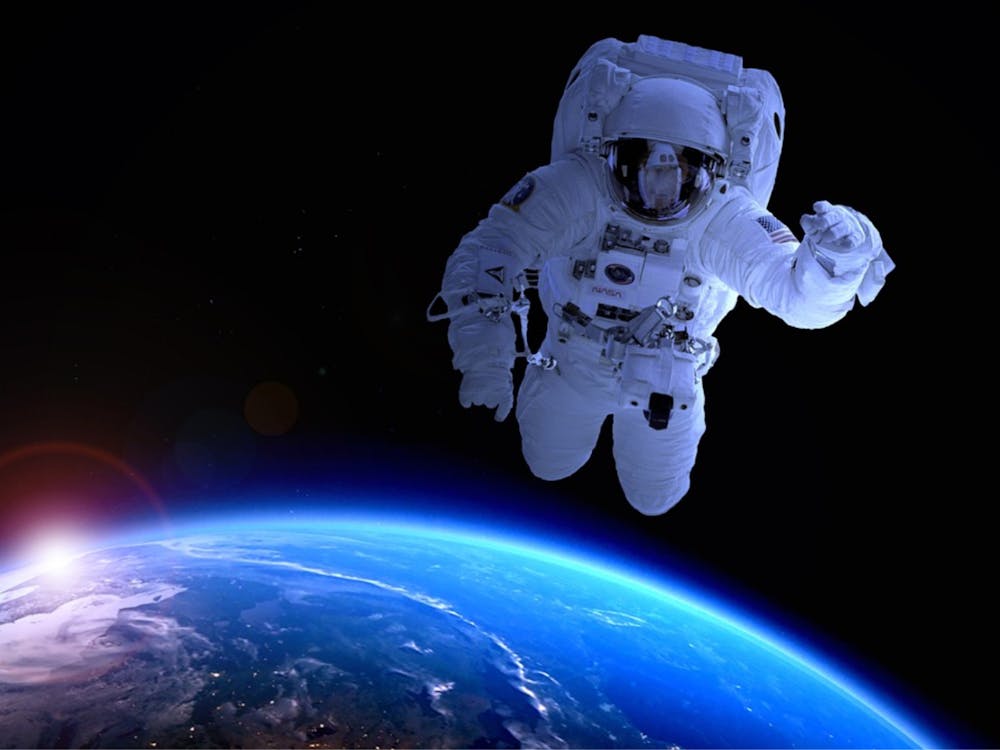The sky is no longer the limit for Duke’s course catalog.
Students and alumni can now register for Space Medicine, a six-week online learning experience set to debut on Coursera later this summer.
Space medicine is the field of medicine in which patients are astronauts and flight crews. Given the extreme conditions of space, finding adequate methods of care can be a complex and difficult task. Space Medicine began as a house course taught during the fall 2020 and spring 2021 semesters by Dominic Tanzillo and Nick Saba, both Trinity ‘21.
“Each week, Nick and I would present a medical case study which would pose an interesting question which would lead us into a study of the physics and physiology of a space environment,” Tanzillo wrote.
The online course will offer participants a similar chance to reflect on questions related to survival in extreme environments, the challenges of living in space and more. Each of the six weeks involves two hours of interactive discussions and case studies, and Tanzillo and Saba have used various multimedia resources to support the material.
Tanzillo was originally introduced to the subject of space medicine while working as a member of Duke EMS during his undergraduate years. His interest continued to grow while completing an internship at the Johnson Space Center during the spring 2020 semester.
Once he came up with the idea for a space medicine house course, Tanzillo reached out to Saba, his eventual co-instructor, and Professor of Physics Ronen Plesser, who sponsored the course.
“For the Coursera course, we took the best elements [of the house course] and turned it into six weeks,” Tanzillo wrote. “We also incorporated some activities for weekly ‘Live Sessions’ to get audiences engaged.”
Teaching the house course was one step, but the process of creating a beefed-up online learning experience required meetings, research and preparation.
Over the course of several months, Tanzillo interviewed NASA engineers, astronauts and doctors, as well as Duke doctors and nurses to better understand what content to include. Saba and Plesser also helped design the syllabus.
The team assumed that prospective students signing up for the class would have little-to-no space medicine experience, so the main focus was to make the course as approachable and understandable as possible.
“We knew that there was a large number of students interested in space that weren’t going to become doctors, so we wanted to show that learning about aerospace medicine and being in that medical mindset could be just as valuable to a flight engineer as it would to a doctor,” Saba wrote. “We want to create a learning environment that can be relatable to anyone interested in space.”
In December 2020, Tanzillo was put in touch with Duke’s Learning Innovation department and fully invested himself in seeing the idea through. Working closely with Senior Learning Experience Designer Megan Lancaster and Quentin Ruiz-Esparza, associate director of Online Duke, the team was able to get the Coursera page up and running. As of June 13, over 150 students had already registered for the class.
To Tanzillo, Space Medicine is far more than a senior project; it is a resource that he wishes he had during the early stages of his undergraduate career and one that he knows will benefit many students to come.
“I discovered this [subject] relatively late in my Duke career, and wanted to introduce other people to the topic,” Tanzillo wrote. To achieve this goal, Tanzillo co-founded Duke Students for the Exploration and Development of Space, worked on the Duke Space Initiative and taught the house course with Saba for two semesters with 35 students.
Additionally, Tanzillo and Saba hope to begin recording a space-medicine-related podcast in the fall and are working with staff to explore if their course can be delivered as a pre-orientation experience as well.
Saba shares his co-instructor’s enthusiasm and hope for the future of space medicine exploration among future students and the world.
“I would emphasize Dominic's goal of expanding this course past Duke students alone,” Saba wrote. “Personally, I see putting a man or base on Mars as a mission that could create some much-needed unity in the world right now, so I hope to increase excitement around that goal in as many people as possible with this course.”
Space Medicine will run from July 12 to Aug. 23 in an interactive online format. Interested students and alumni can register for the free course. Registration closes June 30.
Get The Chronicle straight to your inbox
Sign up for our weekly newsletter. Cancel at any time.
Gautam Sirdeshmukh is a Trinity senior and a staff reporter for the news department. He was previously the health & science news editor of The Chronicle's 117th volume.

